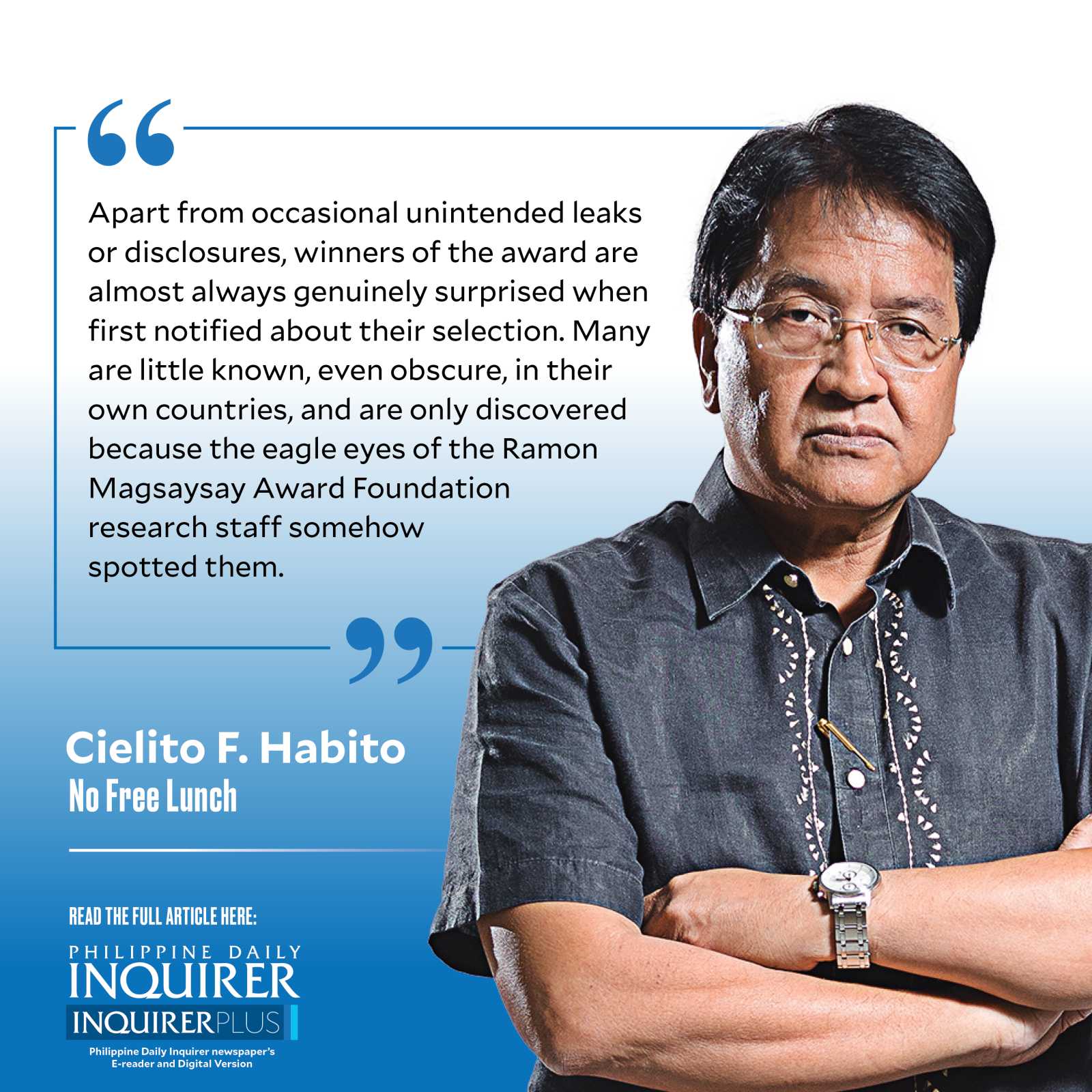
I’ve been getting an annual high for many years now from witnessing the presentation ceremonies of the Ramon Magsaysay Award, considered to be Asia’s premier prize and highest honor, to true exemplars of greatness of spirit in the Asian continent. Without fail, the ceremony has consistently been an emotionally uplifting experience of profound inspiration and hope to me, and surely all who witness it, amidst so much disruption, conflict, bloodshed, injustice, deprivation, and disasters troubling the world today.
The four latest Ramon Magsaysay Award laureates were conferred their awards in a solemn ceremony held last weekend at the Manila Metropolitan Theater—the first fully physical presentation ceremony in four years since the last one on Aug. 31, 2019. The COVID-19 lockdowns forced the Ramon Magsaysay Award Foundation (RMAF) into outright cancellation of the awards in 2020, then holding an entirely virtual awards ceremony in 2021, and a hybrid one last year. Its full return to the physical stage auspiciously marks the 65th year anniversary of what’s often dubbed “Asia’s Nobel prize.” Seeming testament to its credibility and stature is how the award had long “discovered” Mother Teresa of Calcutta 17 years before she won the Nobel Peace Prize in 1979, and the Dalai Lama three decades before he won his Nobel in 1989. The latter sent his representative to join some 40 other former laureates from various countries who joyfully graced the festivities marking the prestigious award’s 65th anniversary. It was very gratifying to learn from him that it was in fact the very first international award ever won by the influential spiritual leader, who had since earned hundreds more.
Not many probably know that almost always, winners of the Ramon Magsaysay Award medal and accompanying cash prize do not even know they had been a candidate until RMAF president Susan Afan (and for many years before her, the late Carmencita “Carn” Abella) directly calls to inform them they had won. Candidates are sought out by the research staff or nominated by select nominators, then fully but discreetly researched on, including field visits to the countries of those who are short-listed. The process painstakingly avoids having the candidate know that he/she is being considered for the prize.
Unlike the Nobel and many other prestigious national and international awards, it is an award that one cannot apply or ask someone to nominate him/her for. Indeed, seeking the recognition is considered to be inconsistent with the greatness of spirit that the award recognizes and extols. Thus, apart from occasional unintended leaks or disclosures, winners of the award are almost always genuinely surprised when first notified about their selection. Many are little known, even obscure, in their own countries, and are only discovered because the eagle eyes of the RMAF research staff somehow spotted them. In truth, the strength and credibility of the award rests on the dedication, competence, and selfless hard work that the RMAF research team has consistently put into their work through the decades.
This year’s crop of laureates covers a diverse field spanning peacemaking (Miriam Coronel-Ferrer of the Philippines), public health for the masses (Ravi Kannan R. from India), inclusive quality education (Korvi Rakshand of Bangladesh), and sustainable agriculture (Eugenio Lemos of Timor-Leste). The RMAF trustees found it fortuitous, perhaps even providential, that even well before the Israel-Palestine war broke out in October, we had decided to invite as guest speaker for the auspicious 65th-year program the Venerable Pomnyun Sunim, himself a 2002 Magsaysay awardee, whose life’s work and keynote speech focused on the theme of peace. At the same time, one of the four prizes this year recognized someone whose work has also focused on forging peace here and overseas. The theme resonates even more loudly at this time that world peace is under threat in the wake of the recent wars that are already rocking the global economy.
And this highlights the importance of new directions that the foundation has set, to move well beyond bestowing awards, but also have young people across the continent imbibe the greatness of spirit demonstrated by the now 348 laureates over the past 65 years. Through the Ramon Magsaysay Transformative Leadership Institute, Asian youth can undergo a program that provides opportunities to learn of the laureates’ good works, and even directly learn from and walk with them through firsthand observation of their work. A six-volume “Greatness of Spirit” book collection has also been launched that immortalizes the example these great men and women have set for all of us. Truly, they are exponents of hope in the deeply troubled world we are in today.

